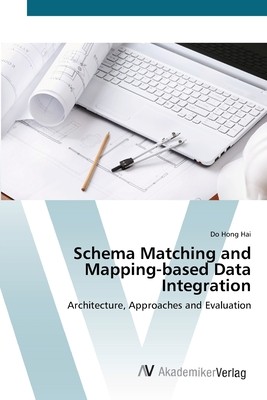
- We will send in 10–14 business days.
- Author: Do Hong Hai
- Publisher: AV Akademikerverlag
- ISBN-10: 3639401247
- ISBN-13: 9783639401240
- Format: 15.2 x 22.9 x 1.3 cm, minkšti viršeliai
- Language: English
- SAVE -10% with code: EXTRA
Reviews
Description
Revision with unchanged content. The book focuses on Schema Matching, the task of (semi-)automatically identifying semantic correspondences between elements of metadata structures, such as, database schemas, ontologies, and XML message formats. It is of key importance for interoperability and data integration in numerous applications, such as data warehousing, integration of web-sources, message mapping in E-business, and ontology alignment on the Semantic Web. However, in today's systems, schema matching is still manual; a time-consuming, tedious, and error-prone process, which becomes increasingly impractical considering the high complexity and number of schemas and data sources to be dealt with. In this book, the author Do Hong Hai describes the architecture, functionality, and evaluation of the schema matching system COMA++ (Combining Matchers), which was developed by himself in his Ph.d thesis. COMA++ represents a generic and customizable system for semi-automatic schema matching, which can combine different match algorithms in a flexible way. In comprehensive evaluations using large real-world schemas and ontologies, COMA++ has shown high quality as compared to the state of the art, proving its practicability for different domains. In addition, the book describes a new data integration approach, GenMapper (Generic Mapper), which utilizes instance-level correspondences between objects of data sources.
EXTRA 10 % discount with code: EXTRA
The promotion ends in 21d.20:56:43
The discount code is valid when purchasing from 10 €. Discounts do not stack.
- Author: Do Hong Hai
- Publisher: AV Akademikerverlag
- ISBN-10: 3639401247
- ISBN-13: 9783639401240
- Format: 15.2 x 22.9 x 1.3 cm, minkšti viršeliai
- Language: English English
Revision with unchanged content. The book focuses on Schema Matching, the task of (semi-)automatically identifying semantic correspondences between elements of metadata structures, such as, database schemas, ontologies, and XML message formats. It is of key importance for interoperability and data integration in numerous applications, such as data warehousing, integration of web-sources, message mapping in E-business, and ontology alignment on the Semantic Web. However, in today's systems, schema matching is still manual; a time-consuming, tedious, and error-prone process, which becomes increasingly impractical considering the high complexity and number of schemas and data sources to be dealt with. In this book, the author Do Hong Hai describes the architecture, functionality, and evaluation of the schema matching system COMA++ (Combining Matchers), which was developed by himself in his Ph.d thesis. COMA++ represents a generic and customizable system for semi-automatic schema matching, which can combine different match algorithms in a flexible way. In comprehensive evaluations using large real-world schemas and ontologies, COMA++ has shown high quality as compared to the state of the art, proving its practicability for different domains. In addition, the book describes a new data integration approach, GenMapper (Generic Mapper), which utilizes instance-level correspondences between objects of data sources.


Reviews